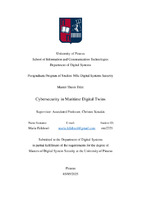| dc.contributor.advisor | Xenakis, Christos | |
| dc.contributor.advisor | Ξενάκης, Χρήστος | |
| dc.contributor.author | Falidouri, Maria | |
| dc.contributor.author | Φαλιδούρη, Μαρία | |
| dc.date.accessioned | 2025-05-16T11:39:27Z | |
| dc.date.available | 2025-05-16T11:39:27Z | |
| dc.date.issued | 2025-05-05 | |
| dc.identifier.uri | https://dione.lib.unipi.gr/xmlui/handle/unipi/17763 | |
| dc.description.abstract | Η τεχνολογία των Ψηφιακών Διδύμων (DTs) έχει γίνει σημαντική για τον ναυτιλιακό τομέα, προσφέροντας καλύτερη αποδοτικότητα, συντήρηση πριν από βλάβες και ανάλυση δεδομένων σε πραγματικό χρόνο. Όμως, η αυξανόμενη χρήση της φέρνει και σημαντικούς κινδύνους για την κυβερνοασφάλεια, απειλώντας την ακεραιότητα, τη διαθεσιμότητα και την εμπιστευτικότητα των ψηφιακών συστημάτων στη ναυτιλία. Η παρούσα έρευνα εξετάζει τις προκλήσεις κυβερνοασφάλειας που σχετίζονται με τα DTs και προτείνει μέτρα για να μειωθούν αυτοί οι κίνδυνοι. Η διατριβή αυτή αναλύει τις ευπάθειες των υποδομών των DTs, περιλαμβάνοντας απειλές για την ασφάλεια των δικτύων, τη μετάδοση δεδομένων, το firmware, το software και το hardware. Στη συνέχεια, αναλύει τους βασικούς κινδύνους κυβερνοασφάλειας, τις επιθέσεις που μπορεί να γίνουν και τα κανονιστικά πρότυπα στον ναυτιλιακό τομέα. Προτείνει επίσης λύσεις για να ενισχυθεί η ασφάλεια σε διάφορα επίπεδα των DTs. Τέλος, παρουσιάζεται ένα gap analysis, συγκρίνοντας το πιο κοινό ναυτιλιακό πρότυπο ασφαλείας, IMO MSC-FAL.1/Circ.3, με ορισμένες συγκεκριμένες απαιτήσεις ασφαλείας για την DTT, οι οποίες επίσης κατηγοριοποιούνται στη μελέτη. Τα ευρήματα ανέδειξαν ακόμη περισσότερο τη σημασία της επικαιροποίησης των υφιστάμενων πλαισίων ασφαλείας, ώστε να συμβαδίζουν με τις τεχνολογικές εξελίξεις, όπως η DTT. | el |
| dc.format.extent | 92 | el |
| dc.language.iso | en | el |
| dc.publisher | Πανεπιστήμιο Πειραιώς | el |
| dc.rights | Αναφορά Δημιουργού-Όχι Παράγωγα Έργα 3.0 Ελλάδα | * |
| dc.rights.uri | http://creativecommons.org/licenses/by-nd/3.0/gr/ | * |
| dc.title | Cybersecurity in maritime digital twins | el |
| dc.type | Master Thesis | el |
| dc.contributor.department | Σχολή Τεχνολογιών Πληροφορικής και Επικοινωνιών. Τμήμα Ψηφιακών Συστημάτων | el |
| dc.description.abstractEN | Digital Twin technology (DTT) has become an integral part of the maritime sector, offering enhanced operational efficiency, predictive maintenance, and real-time data analysis. However, its increasing adoption also introduces significant cybersecurity risks, threatening the integrity, availability, and confidentiality of maritime digital ecosystems. This research examines the cybersecurity challenges associated with DTs and identifies countermeasures to mitigate these risks. The study analyzes a range of vulnerabilities affecting DT infrastructures, including threats related to network security, data transmission, firmware, software, and hardware exploits. It highlights key cybersecurity risks, analyzes potential attacks, and explores the regulatory standards of the current maritime cybersecurity frameworks. Additionally, it proposes countermeasures to enhance security at different functional layers of DTs. Finally, a gap analysis is presented, comparing the most common maritime security standard, IMO MSC-FAL.1/Circ.3 with some specific security requirements for DTT, categorized also in the study. The findings of this gap analysis highlighted even more the importance of updating the existing security frameworks to keep up with technological advancements, such as DTT. | el |
| dc.contributor.master | Ασφάλεια Ψηφιακών Συστημάτων | el |
| dc.subject.keyword | Cybersecurity | el |
| dc.subject.keyword | Maritime sector | el |
| dc.subject.keyword | Digital twins | el |
| dc.subject.keyword | Digital twin technology | el |
| dc.date.defense | 2025-05-15 | |



